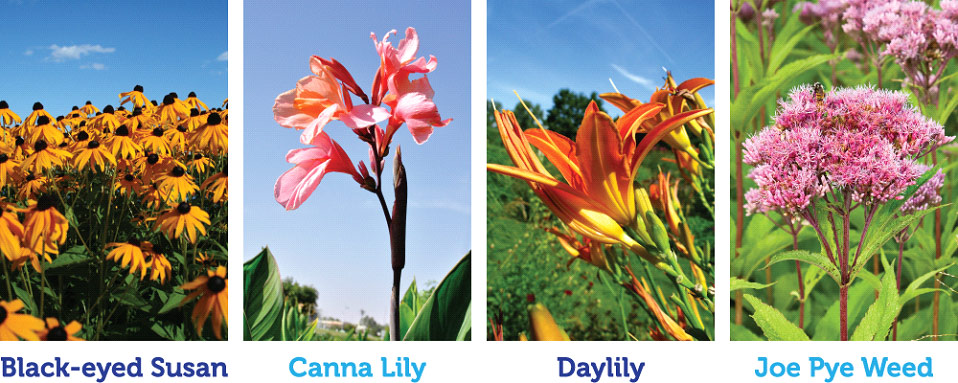We all love beautiful yards, but over-watering, using too many chemicals, and even extra clippings that wash into stormdrains can lead to big problems with nearby waterways. When we overwater, instead of soaking into the ground for our plants, that extra water picks up lawn chemicals and other pollutants and carries it into nearby stormdrains where it flows UNTREATED into our waterways.
The fertilizers and lawn clippings that wash down our stormdrains can cause harmful algae blooms. Pesticides can also get washed into waterways where they can harm local wildlife. But by following some simple tips, you can show off your Blue Thumb and protect our waterways!
Grow Native
Native plants tend to be heartier than non-natives. They often do just fine with only rainfall to water them and typically use less fertilizer. Some well-loved native plants for the Midlands include Black-eyed Susan, Canna Lily, Daylily, and Joe Pye Weed.

For more native plant ideas, visit these resources:
⦁ Lady Bird Johnson Wildflower Center’s List of South Carolina Native Plants
⦁ South Carolina Native Plant Society
⦁ Your local gardening center
Use Only What You Need!
Lawns only need 1″ of rain each week. So use a rain gauge! If the skies give you that inch, save your hose for another time.
Another good tip is to use your rain gauge to judge how long to water. Set your rain gauge under your sprinkler system and let it run for 15 minutes. Measure the water depth, then use the chart below to determine how long to water your lawn each week:
⦁ 1/8″ – 120 minutes
⦁ 1/4″ – 60 minutes
⦁ 1/2″ – 30 minutes
⦁ 3/4″ – 20 minutes
⦁ 1″ – 15 minutes
Watering in the late evening or early morning can also reduce evaporation and ensure that the water actually gets to your plants roots.
When it comes to fertilizer, more is NOT better. Extra fertilizer just gets washed away when it rains, and that’s money down the drain!
⦁ Get a soil test! Before you fertilize, find out exactly what nutrients your yard needs and how much you should apply. You can order your Clemson Extension soil sampler mailer online or through your County Extension Office (Richland or Lexington).
⦁ Learn about proper fertilizer application! Once you know what your yard needs, talk to local experts like your County Extension Office or nursery professionals for tips on how to properly apply fertilizers.
Recycle Your Garden
Why pay for fertilizer when you can make it yourself? Compost your yard clippings and household vegetable scraps to turn into food for your garden.

To make compost, mix greens, like lawn clippings, browns, like dried leaves, and moisture.
For more composting tips, visit:
⦁ Clemson Cooperative Extension Composting
⦁ U.S. EPA’s Composting At Home
⦁ PBS Nature How To Compost Infographic
